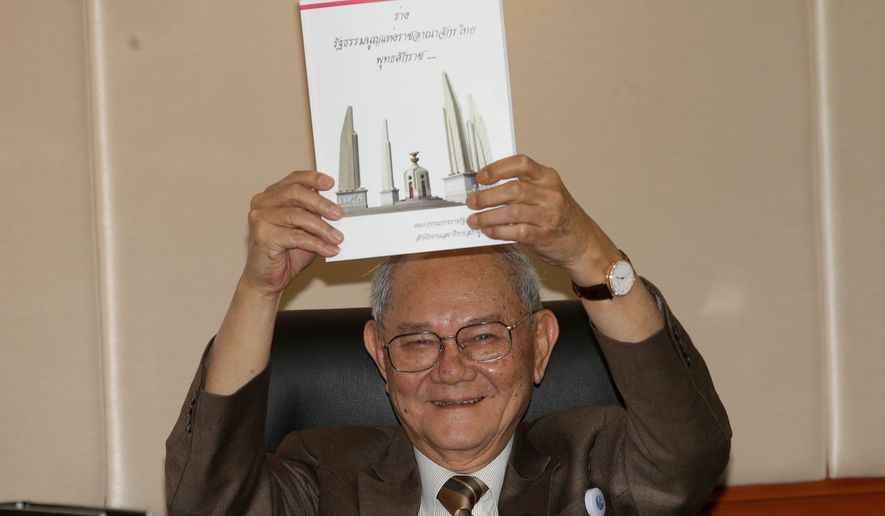BANGKOK, Thailand — Thailand’s coup-installed military regime unveiled a long-awaited new draft constitution Tuesday reserving six seats in the legislature for the security forces, allowing for an unelected prime minister and setting up new checks on popular rule — a blueprint critics here say only pushes a return to democratic rule for a key U.S. ally even further into the future.
The junta headed by Prime Minister Prayuth Chan-ocha, a former army chief, said it will permit about 50 million eligible voters to vote on its constitution in a referendum on Aug. 7 — but anyone who criticizes the charter too strongly could be jailed for 10 years.
If the constitution is approved, nationwide parliamentary elections could be held in 2017.
“The important thing about this constitution — although there is no statement that people have the power — everybody has rights, everybody is equal, everybody is provided with protection,” said Meechai Ruchupan, chairman of the junta’s appointed Constitution Drafting Committee, displaying to reporters the 105-page, 279-article constitution.
The traditionally close relations between Bangkok and Washington have been strained in recent years amid growing criticism of the Thai government’s record on civil liberties and human rights from governments and private activists.
The junta, which seized power in a May 2014 coup, calls itself the National Council for Peace and Order. The proposed constitution allows the NCPO to appoint a panel which chooses Parliament’s 250-member Senate, including six seats for the head of the army, navy, air force and national police, plus the military’s supreme commander and defense permanent secretary.
SEE ALSO: Putin poised to rake in the rubles with arms deals after testing new weapons in Syria
Critics describe the Senate plan as a “coup in disguise,” the Bangkok Post reported in mid-March when details first emerged.
The Senate can stage a no-confidence vote against a future elected government, which would probably be a coalition of parties.
If the move gains enough support in Parliament’s lower House of Representatives, the government could be brought down.
The bicameral Parliament could also select a candidate as prime minister who is not a parliamentarian or even a politician.
That person could become prime minister if the appointed Senate approves.
Mr. Prayuth oversaw the writing of the constitution after he led the 2014 coup which toppled Prime Minister Yingluck Shinawatra and ended the previous charter.
SEE ALSO: Germany to migrants: Integrate and learn language or lose permanent residency
“Please do not assume the [NCPO] government wants to stay in power,” Mr. Prayuth said on March 18. ” … We want the Senate to take care [of Thailand] for a certain period of time so the country can move forward for about five years.”
It is unclear if their opposition will be enough to stop the constitution, which would be Thailand’s 20th in the past 84 years, punctuated by more than a dozen coups. Critics will have to watch their language, the government cautioned
“People who propagate information deemed distorted, violent, aggressive, inciting or threatening so that voters do not vote, or vote in a particular way, shall be considered as disrupting the referendum,” the Election Commission said on Monday. Violators can be imprisoned up to 10 years and fined up to $5,600.
But some are already speaking up.
“I will definitely reject this most horrible draft charter,” said Weng Tojirakarn, an influential leader of the so-called Red Shirts, the faction that backed Ms. Yingluck and her family.
“Having coup makers drafting the charter cannot ever make it democratic,” Mr. Weng told the Khaosod news agency Tuesday. “It is like our ears, eyes and hands are being tied or shut.”
The new constitution’s provisions for unelected senators and other clauses are widely perceived as bid to prevent Ms. Yingluck and her more popular brother, exiled former Prime Minister Thaksin Shinawatra, from returning to power.
“The key concern of the military junta is to act to ensure that [Mr. Thaksin’s party] can never win a majority, for as long as he continues to retain his still considerable popularity,” Titipol Phakdeewanich, dean of the faculty of Political Science at Ubon Ratchathani University, said in a recent interview.
“Thailand is simply an autocratic society that occasionally toys with democracy, or a stop-start democracy that regrettably retreats into authoritarianism, each decade or so,” Mr. Titipol said.




Please read our comment policy before commenting.